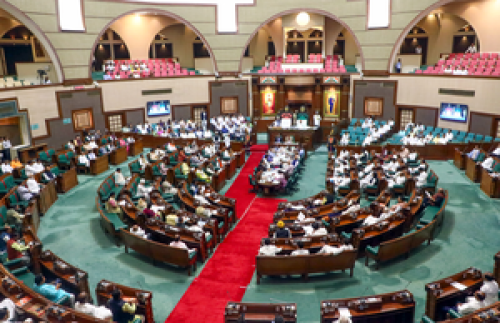YASHWANT RAJ Washington, March 31 (IANS) After failing to prevent the city of Seattle from outlawing caste-based discrimination, right-wing Hindu Americans are girding up to stop the state of California from going down that route. The Hindu Policy Research and Advocacy Collective USA (HinduPACT USA), an initiative of Vishwa Hindu Parishad America, has launched a campaign to collect signatures to a petition asking the California Senate "to Reject SB-403 to Protect Hindus from Discrimination". The Hindu American Foundation, an advocacy body, has opposed the bill in a letter to Democratic state Senator Aisha Wahab, said in a statement it looks forward to "educating" her on the acecomplex issue of caste". SB-403 is a legislation introduced by Wahab last week, which according to a press announcement, seeks to clarify California civil rights law to explicitly include protection against discrimination based on a person's position in a caste. Wahab is not exactly new to the issue of caste. "I'm familiar with the impact of caste discrimination from witnessing what friends and their families experienced when growing up in Fremont," she said. "Prior to assuming office, people in my district shared with me their stories of caste discrimination, and I felt they deserved appropriate protections." Afghan-descent Wahab announced the bill last week at a press conference, accompanied by activists and long-time campaigners, who were also at the forefront of the effort led by City council member Kshama Sawant that made Seattle the first city in the US to outlaw caste-based discrimination. It has passed in the Seattle city council 6-1, defying a high-decibel campaign launched by right-wing Hindus Americans from around the country. California could now become the first US state of ban caste-based discrimination if Senator Wahab's legislation is enacted. "This bill is about workers' rights, women's rights, and civil rights," Wahab said, announcing the bill at the news conference. "To ensure organisations and companies do not entrench caste discrimination in their practices or policies our laws need to plainly state that discrimination based on caste is illegal." The first case of caste-based discrimination to catch make national headlines in the headlines came from California in 2020 when the states' civil rights department sued Cisco, the networking gear and business software company, on a petition from an Indian-descent employee that the company's human resources department did not take cognizance of his complaint of caste-based discrimination by two of his Indian-descent seniors. In 2022, California State University, which is America's largest public university system, banned caste-based discrimination after years of activism by Dalit students, including Nepalese-descent Prem Pariyar. Several other US universities are said to be planning the same. Right-wing Hindu Americans oppose the ban arguing, first, that though caste-based discrimination is appalling, any law banning it here in the US puts a target on the backs of the entire South Asian community, specially Hindus, by portraying them all as purveyors of this practice. Second, they have argued that discrimination based on caste is covered by existing laws that outlaw all kinds of bias and discrimination and there is no need for a new ban. Their third, and final, argument is that caste bias in the US is rare and not as rampant as it has been made out to be. They have questioned data cited by supporters of the ban. "We share the admirable goals of standing up for civil rights and eliminating all forms of prejudice and discrimination, including based on caste," the Hindu American Foundation said in its letter to Senator Wahab the day after she announced the bill. It added: "So the question is not whether we should deal with any allegations of caste discrimination, but how. As such, if and when incidents of caste discrimination occur, they should be brought to light, thoroughly investigated and rectified under existing law in its current form." Wahab has been expecting this pushback, as has happened in the past to all legislative initiatives regarding civil rights. "My office has already begun to field opposition inquiries to this bill. What the opposition would have you believe is that this bill's effort to provide clarity of language in state law and protection to caste- oppress Dalits in particular, or formerly known as the untouchables is in turn targeting a different group of oppressed people. That is not the case."
Right-wing Hindu Americans now seek to stop California from banning caste bias
- by Rinku
- March 31, 2023 2 minutes

aisha-wahab











